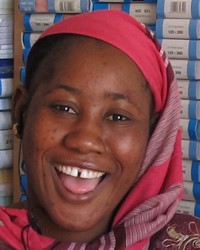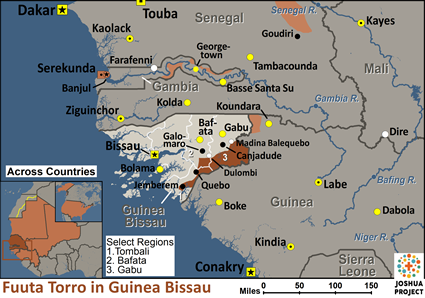The Fuuta Torro are thought to have descended from the Fulani and the Wolof or Serere tribes. They have retained their respective languages, and many are also bilingual in Arabic. While the majority of Fuuta Torro live in Senegal, another significant group lives in Guinea, where they comprise a very small percentage of the population. There are also small four other West African countries.
Most Fuuta Torro live a rural life. They raise livestock, farm, and fish. They live in small villages in round huts made of clay or rough bricks, with straw roofs. Their dietary staples include rice, millet, sorghum, fish, nuts, and fruit. A steadily rising population and an unequal distribution of land have led to the emigration of large numbers of Fuuta Torro, particularly young people, to cities in search of better job opportunities. Traditional Fuuta Torro society is divided into four main social classes, each having twelve "castes. " Their social life is a mixture of local customs and Islamic traditions. Neither Islam, the effects of colonization, nor the goals of various national leaders have been able to erase the old social divisions. The torobe are the aristocratic class. A group of elders from this caste governs villages. The middle class, or rimbe, is made up of fishermen, farmers, tradesmen, and administrators. The middle class includes the craftsmen, and the lower class includes the freed slaves and the slaves. Social status rarely changes. The Fuuta Torro marry within their class divisions, women usually between the ages of 16 and 18, and men between the ages of 25 and 30. Although it is uncommon, a man may have up to four wives. Families are generally large, with an average of six children per family. Pulaar women often wear large, embedded pieces of wood in the soft lobes of their ears and have two small facial slits near the outside corners of both eyes. Although female genital mutilation is becoming increasingly illegal, over half of Fuuta Torro girls from the ages of three to nine undergo ritual genital circumcision to be considered "clean" and worthy of marriage.
The Pulaar proudly acknowledge themselves as the first black Africans to convert to Islam although spiritism and magic play a significant role in daily life.
The Fuuta Torro first accepted Islam in the eleventh century. Traditional Muslim beliefs, such as the nature of man and his destiny after death, play a significant role in the people's outlook on life. Muslim Brotherhoods teach a mystical approach to Islam: the people seek closer relationships to God through rituals, prayer, and other techniques. Islam has not brought any major changes to Fuuta Torro s attitudes toward spiritism and magic. The people use charms, amulets, and witchcraft. The Pulaar attribute supernatural powers to various Muslim clerics who practice divination, the use of supernatural powers.
Islam has a profound impact on every aspect of Fuuta Torro life. A somewhat isolated people with minimal exposure to other religious ideas, the Fuuta Torro view the world and gain their identities from their rigid beliefs in the Islamic family and community. They are extremely reluctant to leave the world they know. Decreasing income from the sale of agricultural products, encroachment by the Sahara Desert on farmland, deforestation, and increasing population are resulting in extreme financial concerns for the Pulaar Fulani. Nearly all village water sources are polluted. Malaria and infectious diseases inflict a heavy toll each year. Although there is some literacy among the aristocracy, most Pulaar people are illiterate.
Pray for the Lord to provide for the Fuuta Torro so well that they acknowledge his goodness and power. Pray for the Lord to intervene among the Fuuta Torro in Guinea and Mali in such a way that they will become open to accepting the lordship of Christ. Pray for workers to go to the Fuuta Torro. Pray for a movement to Christ among the Fuuta Torro that will spread to other Fulani groups.
Scripture Prayers for the Fuuta Torro in Guinea-Bissau.
| Profile Source: Joshua Project |


























